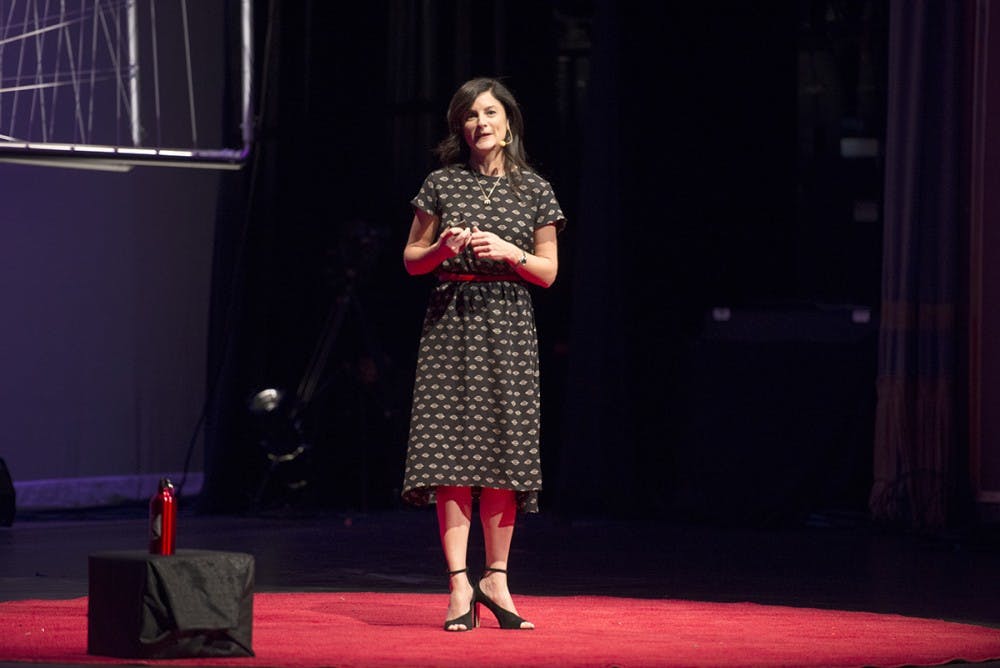The fifth TEDx Charlottesville conference was held at the Paramount Theater in downtown Charlottesville last Friday.
Speakers discussed topics ranging from social justice to female empowerment, with a significant portion of the talks being focused and science and technology.
Christian Howard, a Ph.D. candidate at the University, demoed a miniature humanoid robot, called “Now”, developed by the computer engineering program at the University. “Now” then played songs such as “Popular” following a few humorous remarks to entertain the audience.
Howard continued on to talk about who would be responsible for the actions of robots and how the ownership of those interactions seem to mirror human-to-human relationships. As the field of robotics grows, she said, the boundaries of responsibility for a robot’s actions blur.
“As robots become more humanlike, we are increasingly faced with ethical questions about how to design robots and how to treat them,” Howard said. “Can a robot learn to cheat, to lie or to steal? Can a robot make a mistake or break the law?”
Kirsten Martin, a researcher and writer who specializes in digital privacy, then spoke on digital data protection. She compared digital privacy infringement to the equivalent of younger siblings eavesdropping on conversations. In the digital realm, however, Martin acknowledged that all too often consumers are unaware of how their information is collected.
“We go online. We look up something we need or are concerned about and somehow or another that information shows up in an ad,” Martin said. “Data aggregators and data brokers pull together little bits and pieces of information from across different websites.”
Martin then introduced the concepts of privacy trackers, data withholding and blocking software. She emphasized each consumer’s power to reward trustworthy businesses to reshape the concept of privacy.
Pete Myers — who is the founder of the Daily Climate website and author of the bestselling book, “Our Stolen Future,” which discusses the contaminants found in common objects — talked about the perils of endocrine disrupting compounds and the pitfalls of today’s regulatory tests.
“Endocrine disrupting compounds have one suite of effects at high doses and another suite of effects at low doses. You can’t predict one from the other. Yet all regulatory testing never tests at the low dose range,” Myers said. “How we assess safety is based on profoundly flawed assumptions.”
Myers showed examples of animals like frogs and rats who were exposed to tiny concentrations of contaminants when they were developing and later developed debilitating and even fatal complications.
In order to reduce their own exposure to harmful compounds, Myers said consumers had to make informed choices and to challenge conventional consumer attitudes about safety.
Rafe Furst, an entrepreneur, investor and World Series of Poker champion, then spoke on the relationship between money and empathy. After seeing the impact of money and greed on his level of compassion, Furst maintains there is a need to reboot the values of the global monetary system. Along with this reboot, Furst said that he believes that the future of money is in cryptocurrencies, digital currencies independent from large financial institutions.
“We are at the dawn of programmable money. For the first time in history, we have the power to change how it works,” Furst said. “We can come together, those of us who care, and design currencies which serve our communal needs which reflect our values and our priorities.”
The solution, Furst said, starts with recognizing our global interdependence and cooperating on a human level.
Sanjiv Singh — a research professor at Carnegie Mellon’s Robotics Institute and CEO and co-founder of Near Earth Autonomy, which develops autonomous air transportation technology — spoke on the developing future of self-driving aircrafts.
“The revolutionary concept is this — of course they can takeoff and land anywhere, but you’re going to get inside one of them, and press a button and it will fly you to where you need to go,” Singh said.
According to Singh, there is potential for this autonomous air travel to disrupt the transportation industry. Developments are impeded by issues of economics and policy, despite the existence of the necessary technology.
Gregg Hallinan, an assistant professor of astronomy at the California Institute of Technology, then spoke on the detection of a gravitational wave on Aug. 17. The ripple in gravitational space was a result of the collision of two stars which consequently created 10,000 Earth-masses worth of heavy elements, such as gold and platinum. This is the first gravitational detection of an inter-star merger which provides new information on the environment in which the collision took place. The detection of gravitational waves paired with telescope imaging is akin to seeing and hearing the collision at the same time.
The wave detected on Aug. 17 had been travelling at the speed of light for 130 million years prior to its detection this year. Hallinan predicts this event is the first of more frequent gravitational ripples. As technology improves, Hallinan said there is potential to learn more about the creation of heavy metals from such collisions and the the possible formation of black holes following the mergers.
“You’ll also be seeing a lot of really tired astronomers,” Hallinan said.
According to the event program, TEDx Charlottesville was intended to “spark deep discussion and thought among attendees, speakers, volunteers and the community as a whole.” A recording of the event can be found on the TEDx Charlottesville website.







